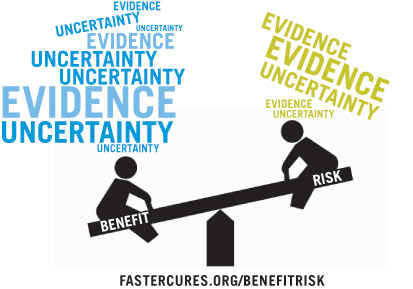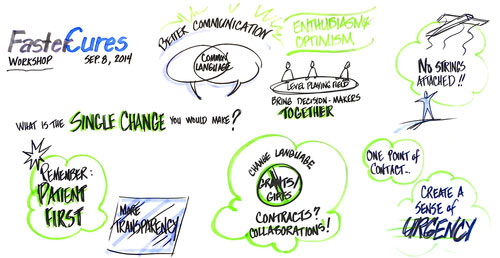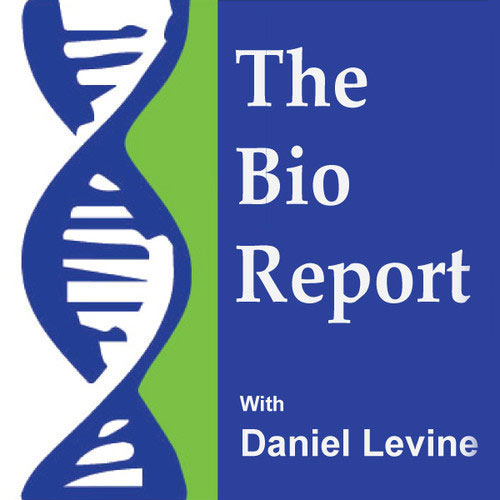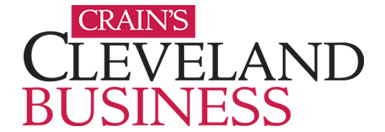| Forward to a friend | View web version » |
 |
Advancing the science of patient input
As we kick off another new year, I find myself energized by the shared emphasis across all sectors of medical research on the importance of the patient's role. Call it patient-focused, patient-centered, patient-engaged — whatever the catch-phrase, the point is that patients are the reason that medical research happens, and they should be at the core of the R&D process. At FasterCures, we like to think of it as advancing the science of patient input, something we saw increase in 2014 via the U.S. House Energy & Commerce Committee's 21st Century Cures initiative, the increased attention on the role of venture philanthropy, and the dialogue about expected benefits and tolerable risks of new therapies, to name a few. In fact, I recently highlighted it as one of the top 10 medical research issues and trends to watch in 2015.
Momentum is growing as many sectors of medical research recognize the value of involving patients throughout the process and not just a group to reach out to after decisions have been made on their behalf. Will 2015 be the year that patients' needs and preferences are more systematically captured and reflected in R&D? We hope so. Now that we agree on the value that patients bring to the process, it's time to act. Patients are waiting.

Margaret Anderson
Executive Director

|
|
| Events |
 Webinar series kicks off with 2015 policy landscape »
Webinar series kicks off with 2015 policy landscape »
The first TRAIN Webinar of the year, "2015 policy landscape: A biomedical R&D planning guide," will take place Tuesday, Jan. 29, from 1 to 2 p.m. Eastern. During this free Webinar, hear from experts in federal budgetary, legislative, and regulatory matters and find out what to expect from Washington, DC, including when and how to plug in, and where to direct input for greatest policy impact this year. We plan to demystify what is happening in policy and get you excited for what is possible. This free Webinar is part of FasterCures' Webinar series designed to spotlight innovative approaches to disease research, part of The Research Acceleration and Innovation Network (TRAIN).
 .@FasterCures 2015 Webinar series kicks off with look @ #medicalresearch policy landscape ow.ly/HjJRl .@FasterCures 2015 Webinar series kicks off with look @ #medicalresearch policy landscape ow.ly/HjJRl |
| Issues |
Innovative financing
PAS programs help philanthropists give smarter »
- FasterCures' Philanthropy Advisory Service (PAS) has launched a new Giving Smarter Program for Neurofibromatosis (NF), which will help to objectively identify a set of research priorities that have the potential to advance the development of treatments for NF. Working closely with key stakeholders in the NF community, this program will complement ongoing research efforts so that our findings can be leveraged by all stakeholders.
- FasterCures will host leading researchers at an Alzheimer's Call to Action Retreat Jan. 28–29 in Las Vegas. The aim of the meeting is to identify and prioritize research efforts that are poised to have a high impact on the field and could benefit from strategic philanthropic investment.
 .@FasterCures #Philanthropy Advisory Service helps philanthropists give smarter pas.fastercures.org .@FasterCures #Philanthropy Advisory Service helps philanthropists give smarter pas.fastercures.org |
Science of patient input
 FasterCures urges FDA to realize promise of patient participation »
FasterCures urges FDA to realize promise of patient participation »
Recently, FasterCures submitted comments to the U.S. Food and Drug Administration (FDA) about the agency's activities to enhance patient participation in medical product discussions. These comments were informed through FasterCures' work to advance patient-centered benefit-risk assessment, including dialogue with its Benefit-Risk Advisory Council, consultations with TRAIN's venture philanthropy organizations, formal and informal discussions with stakeholders across the biomedical ecosystem who convened at Partnering for Cures, and conversations initiated during our Benefit-Risk Boot Camp. The recommendations called for an intentional evolution from the FDA's traditional engagement with individuals who serve as spokespersons for a disease/condition to an evidence-based, data-driven understanding of the range of patients' experiences.
 .@FasterCures urges @US_FDA to realize promise of #patient participation ow.ly/H432Y .@FasterCures urges @US_FDA to realize promise of #patient participation ow.ly/H432Y |
 Understanding tradeoffs: A benefit-risk bloggersation »
Understanding tradeoffs: A benefit-risk bloggersation »
Assessing benefits and risks is core to medical product development, regulation, and healthcare decision-making. The tradeoffs between desired benefits and tolerable risks may look quite different whether you're a patient, a physician, a regulator, or a drug/device developer. Find out more about this topic from three of our Benefit-Risk Advisory Council members — Patricia Furlong of Parent Project Muscular Dystrophy, Bennett Levitan of Janssen Pharmaceutical R&D, and Robert Meyer of the University of Virginia School of Medicine.
 Understanding tradeoffs: A @FasterCures #benefitrisk bloggersation ow.ly/HjLI8 Understanding tradeoffs: A @FasterCures #benefitrisk bloggersation ow.ly/HjLI8 |
Venture philanthropy
 How would you change university-foundation partnerships? »
How would you change university-foundation partnerships? »
The evolving relationship between nonprofit disease foundations and research institutions presents new and exciting opportunities, as well as new conflicts. In a recent report, University-Foundation Relations: From Transactional to Transformative Partnerships, FasterCures notes that while both patient foundations and research institutions share the goal of translating research into effective therapies for patients, differing views about how to best achieve these goals have negatively impacted these partnerships. The report presents five work streams directed at improving these collaborations.
 How would you change university-foundation partnerships? @FasterCures #nonprofit #IP http://ow.ly/Hkxmp How would you change university-foundation partnerships? @FasterCures #nonprofit #IP http://ow.ly/Hkxmp |
| In the News |
 |
Nature Biotechnology: Foundation receives $3.3-billion windfall for Kalydeco
"The wider business community will wake up and take notice of nonprofits, if they haven't already." — Margaret Anderson, Executive Director |
 |
Forbes: 2014 New Drug Approvals Hit 18-Year High
"While innovation during the pre-2010 decade was dominated by mediocre drugs that were overpriced, we are now seeing cure rates (hepatitis) or remission rates (cancer) that are nothing short of stunning… This suggests that far from running out of innovation, we are actually on the cusp of a hyper-innovation age that will see treatment options expand from small molecules, monoclonals, and peptides to a whole range of new and more effective therapies." — Bernard Munos, Senior Fellow |
 |
The Bio Report: How new funding models are accelerating drug development
"Venture philanthropy keeps a focused, longer view where patients are put at the front, at the center, at the end of the process." — Margaret Anderson, Executive Director |
 |
Crain's Cleveland Business: Disease foundations invest in startups
"That deal is going to push even more disease foundations to think about ways to generate revenue from the drugs they help develop." — Kristin Schneeman, Program Director |
|
| Tools You Can Use |
 We are FasterCures »
We are FasterCures »
During Partnering for Cures in November 2014, we asked participants why faster cures matter to them. Find out their answers in this 2-minute video. If you like what you see, help us spread the word by sharing the video.
 .@FasterCures asked why we do what we do. The answer? To help #patients. ow.ly/HjMXP .@FasterCures asked why we do what we do. The answer? To help #patients. ow.ly/HjMXP |
 |
| If you have questions or would like more information about any of the items above, please contact info@fastercures.org. |
|
|
|
|
|
|